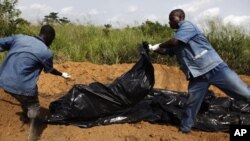Human Rights Watch is calling on Ivory Coast to follow through on promises of impartial justice for the perpetrators of war crimes during the country's post-election crisis.
The dispute over who won a November presidential poll plunged Ivory Coast back into civil war late last year. Approximately 3,000 people were killed and at least 500,000 were displaced before supporters of U.N.-endorsed election winner Alassane Ouattara defeated forces of the incumbent president, Laurent Gbagbo, who had refused to give up power.
In a report released Thursday, Human Rights Watch (HRW) says it has documented war crimes and rights abuses by forces loyal to both men during the crisis.
HRW names 13 political and military leaders as being implicated in serious crimes, including former president Gbagbo, his former youth minister, Charles Ble Goude, who led the notorious Young Patriots militia, and four leaders from Mr. Ouattara's camp.
Since taking office, President Ouattara has repeatedly pledged to hold perpetrators on both sides accountable. However, Human Rights Watch says no one from Ouattara's camp has been arrested, while 118 of Gbagbo's allies are currently in jail.
HRW Ivory Coast researcher Matt Wells says Ivory Coast risks sliding back into divisions that have already caused two wars in the past decade.
"What looks to be right now one-sided or victor's justice is a real threat to the reconciliation that the country is trying to go through right now," said Wells. "It is only through impartial justice that the country will move forward from this most recent state of violence and re-establish the rule of law."
Ivory Coast's justice minister did not respond to multiple calls for comment by VOA.
HRW says beginning last December, armed forces and militia loyal to Gbagbo kidnapped and killed political leaders from Ouattara's coalition and gang-raped women believed to support Ouattara. HRW says pro-Gbagbo militia stopped hundreds of perceived Ouattara supporters at checkpoints and beat them to death with bricks, burned them alive or executed them by gunshot.
In March, pro-Ouattara forces, now known as the Republican Forces, swept through the country's far west and south and finally took the commercial capital, Abidjan, in early April with the support of U.N. and French troops.
HRW researcher Wells says as pro-Ouattara fighters moved through the villages of the far west, they killed civilians from pro-Gbagbo ethnic groups, raped women, burned villages, and took part in the massacre of hundreds of civilians in the western town of Duekoue.
"The Gbagbo camp is who spurred the violence and there is no disputing that and we never have," said Wells. "From the first days after the election, when he [Gbagbo] refused to step down, they used violence to try to maintain power. But at the same time, the Republican Forces beginning in March with the military offensive, are clearly implicated in war crimes and likely crimes against humanity as well."
Wells said regardless of who struck first or the fact that the Republican Forces were removing an illegitimate leader with the support of the international community, crimes are crimes and victims deserve justice.
President Ouattara called the International Criminal Court, known as the ICC, to open an investigation into post-electoral violence. HRW says the ICC received authorization to do just that this week.
Wells said the ICC has a "crucial role" to play in bringing high-level leaders to justice but the work should not stop there.
"It is absolutely necessary that prosecutions take place at the domestic level both because the ICC is likely to only take on a few cases and because you can have far greater resonance for the victims and for the people of Cote d'Ivoire when trials take place domestically," said Wells.
Ivory Coast launched a South African-style Truth and Reconciliation Commission at the end of September, however Wells said it is unclear what role the commission will play in the justice process.




